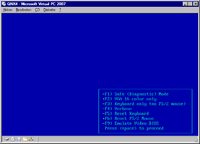Difference between revisions of "QNX"
From Computer History Wiki
m (wikify RTOS) |
(acquisition & version history) |
||
| Line 1: | Line 1: | ||
[[Image:Qnx4n000.png|thumb|right|200px|QNX 4.0 boot]] | [[Image:Qnx4n000.png|thumb|right|200px|QNX 4.0 boot]] | ||
| − | QNX was noted for being used as the | + | QNX was noted for being used as the [[Operating system|OS]] for the i Unisys ICON computer systems in Ontario High schools. It's a [[POSIX]] influenced [[Real-time system|RTOS]]. |
== History == | == History == | ||
* 1982: Quantum Software - QUNIX for Intel 8088 | * 1982: Quantum Software - QUNIX for Intel 8088 | ||
| + | * 1984: QUNIX was renamed to QNX | ||
| + | * 2004: QNX is acquired by Harman International Industries | ||
| + | * 2010: QNX is acquired by BlackBerry | ||
== QNX 4 == | == QNX 4 == | ||
| − | Latest Version: | + | Versions of QNX 4 were released between 1990 and 1997. QNX 4.24 was used as the origin of QNX/Neutrino. Future versions (except for 4.25) are based on the QNX/Neutrino fork. |
| + | |||
| + | Latest Version: 4.25 | ||
== QNX 6 == | == QNX 6 == | ||
| − | + | Versions of QNX 6 were released between 2001 and 2014, based on the QNX/Neutrino fork. Neutrino added support for [[MIPS]], PowerPC, SH-4, and [[ARM]] CPU architectures. | |
| + | |||
This should be what RIM has purchased for use in the Playbook tablet. | This should be what RIM has purchased for use in the Playbook tablet. | ||
| + | |||
| + | Latest Version: 6.6 | ||
| + | |||
| + | == QNX 7 == | ||
| + | |||
| + | QNX 7 is the current version, initially released in 2017. Supported CPU architectures include 32-bit and 64-bit ARM, and 64-bit x86. | ||
| + | |||
| + | Latest Version: 7.1 (2020) | ||
| + | |||
| + | == References == | ||
| + | * [http://www.qnx.com/developers/docs/qnxcar2/index.jsp?topic=%2Fcom.qnx.doc.neutrino.getting_started%2Ftopic%2Fpreface_History.html Preface to the QNX Neutrino Programmer's Guide] | ||
| + | * [https://www.qnx.com/developers/docs/7.1/#com.qnx.doc.neutrino.prog/topic/64bits.html Programmer's Guide: 32- and 64-Bit Architectures] | ||
| + | * [https://webcache.googleusercontent.com/search?q=cache:EnqHVmO55MEJ:www.qnx.com/developers/docs/qnxcar2/topic/com.qnx.doc.neutrino.getting_started/topic/s3_qnx2nto_Platforms.html&hl=en&gl=us| QNX Neutrino - MIPS, PPC, SH4, and ARM Support] | ||
| + | * [https://www.qnx.com/developers/articles/rel_6423_0.html QNX Software Development Platform 7.0: Release Notes] | ||
| + | * [https://www.forbes.com/sites/greatspeculations/2014/06/06/a-look-at-blackberrys-qnx-business/?sh=1282d1eb1123 Forbes: A Look at BlackBerry's QNX Business] | ||
{{stub}} | {{stub}} | ||
[[Category:Operating Systems]] | [[Category:Operating Systems]] | ||
Revision as of 11:01, 20 December 2023
QNX was noted for being used as the OS for the i Unisys ICON computer systems in Ontario High schools. It's a POSIX influenced RTOS.
Contents
History
- 1982: Quantum Software - QUNIX for Intel 8088
- 1984: QUNIX was renamed to QNX
- 2004: QNX is acquired by Harman International Industries
- 2010: QNX is acquired by BlackBerry
QNX 4
Versions of QNX 4 were released between 1990 and 1997. QNX 4.24 was used as the origin of QNX/Neutrino. Future versions (except for 4.25) are based on the QNX/Neutrino fork.
Latest Version: 4.25
QNX 6
Versions of QNX 6 were released between 2001 and 2014, based on the QNX/Neutrino fork. Neutrino added support for MIPS, PowerPC, SH-4, and ARM CPU architectures.
This should be what RIM has purchased for use in the Playbook tablet.
Latest Version: 6.6
QNX 7
QNX 7 is the current version, initially released in 2017. Supported CPU architectures include 32-bit and 64-bit ARM, and 64-bit x86.
Latest Version: 7.1 (2020)
